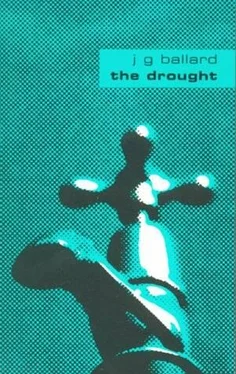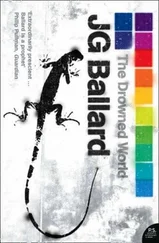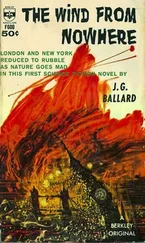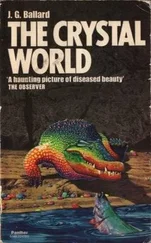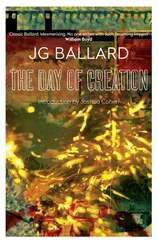"I wish you both luck," he called back over his shoulder. "You have a lot in common."
Quilter stared after him, his eyes suddenly glazed, fingers absently feeling the bloodstreaked neck of the peacock hanging from his belt. Then he came to, and with virulent energy hurled after Ransom: "We'll have more later, doctor! Much more!"
Outside the zoo, Ransom waited before crossing the street. He rested against the trunk of a. dead plane tree, watching the deserted houses. Quilter's absurd words, crazier than even he could understand, echoed in Ransom's ears. Normally the youth would have tittered at the grotesque implications of the remark, but his obvious conviction in this new realm of possibility open to him made Ransom suspect that he was at last out of his depth. Perhaps the boy was regaining his sanity-no lunatic would ever dream up such an implausible fantasy.
Retracing the route Whitman had taken, Ransom set off across the street. The houses were empty, the garbage fires drifting from the gardens. The city was silent, the huge billows of the burning oil fires still rising into the air over his head. A door swung open, reflecting the sun with a sharp stab. Somewhere to his left there was a clatter of cans as a lost dog overturned a refuse bin.
Barely filtered by the smoke, the sunlight burned across the ashy dust, the flints of quartz stinging his eyes. After walking for a quarter of an hour, Ransom regretted not bringing a flask of water. The dust filled his mouth and throat with the dry taste of burning garbage. Leaning on the fender of a car, he massaged his neck, and debated whether to break into one of the houses.
A short way ahead he passed an open front door. Pushing back the gate, he walked up the path to the porch. Hidden by the shade, he glanced up and down the empty street. Through the door he could see into the living room and kitchen. Cardboard cartons were stacked in the hall, and unwanted suitcases lay across the armchairs.
He was about to step through the door when he noticed a small sign drawn in the dust beside the path a few feet from him. The single loop, like a child's caricature of a fish, had been casually traced with a stick lying on the path nearby.
Ransom watched the houses around him. The sign had been made in the last few minutes, but the street was silent. He walked off down the path. His first reaction was to blame Quilter for the sign, but he then remembered the two fishermen's women in black shawls whom he had seen from the tanker, and the strange congregation at the church that morning. The sign outside the church had been the same simple loop, by coincidence the rebus used by the first Christians to identify themselves to one another. The fishermen's sullen expressions as they listened to the Reverend Johnstone's sermon on Jonah and the gourd were probably in many ways like those on the pale obsessed faces of the primitive fishermen who left their nets by the Sea of Galilee.
A hundred yards away a black-suited figure moved behind a wall. Ransom stopped, waiting for the man to come out into the road. Quickening his pace, he set off along the avenue again, ignoring a door that opened somewhere behind him. Deliberately avoiding the route he and Whitman had taken, he turned left at the first intersection, then right again into the next street. Behind him, the ash drifted down across the roads, lightly covering his footprints.
Five minutes later he could hear around him the muted running steps of the men following his path. Hidden behind the intervening walls and houses, they moved along with him, extending in two wide arcs on either side, like a group of small boats tracking a sounding whale. The muffled footsteps padded across the empty porches with the faint creak of dry wood. Ransom crouched down and rested between two cars. Behind him the smoke plumes rising from the gardens were disturbed and broken.
He strode on again, pausing only at the crossroads. Despite his progress, Larchmont still seemed to lie two miles away beyond the dusty rooftops, as if his invisible pursuers were steering him in a circle. Wondering why they should bother to follow him, he remembered Catherine Austen's gibe-perhaps the fishermen marooned ashore by the dying lake and river were hunting for some kind of scapegoat?
He slowed down to regain his breath, and then made a last effort. He broke into a run and turned left and right at random, darting in and out of the cars in the hope of throwing off his pursuers. To his relief they seemed to drop behind. He turned again into the next street, and then found that he had blundered into a small cul-de-sac.
Retracing his steps, Ransom saw two black-suited figures scuttle through a gap in a ruined wall. He raced along the white dust covering the sidewalk, but suddenly the road was full of running men, vaulting across the cars like acrobats. A large net lay over the sidewalk. As he approached, it rose into the air, cast at him off the ground. Ransom turned and clambered between two cars. In the center of the road half a dozen men appeared around him, arms outstretched as they feinted with their nets, watching his feet with intent eyes. Their black serge suits were streaked with ash.
Ransom tried to break through them, using his weight to shoulder two of the small men aside. A net was thrown over his face like a heavy shawl. Knocking it away with the valise, he tripped in the tarry skeins underfoot, cast at him like lassoes from all directions. As he fell the fishermen closed around him, and the nets caught him before he could touch the ground. Swept off his feet, he was tumbled onto his back in the huge hammock, then lifted into the air on a dozen arms as if he were about to be tossed to the sun. Pulling at the thick mesh, he shouted at the men, and caught a last confused glimpse of their thin pointed faces below their caps. Then there was a wild scramble across the road, and his shoulders struck the ground. Swept up again, he collided head-on with the fender of a car.
Illuminated by the tinted sky, the curved beams rose above him on either side, reaching inwards to the open space over his head like the ribs of an immense stranded whale. Lying back on the mattress of old rags, Ransom counted the huge girders, for a moment imagining that he was indeed lying within the bowels of some beached leviathan, its half-rotten carcass forgotten on the shore.
Between the beams the lower sections of the hull-plates were intact, and walled him into the hold. Beyond his feet was the prow of the ship, one of the old herring-trawlers in the breakers' yards somewhere along the river toward Mount Royal. Metal ladders reached up the outer sides of the hull, and the floor was covered with piles of rusty metal sheeting, portholes, and sections of bulkhead. In the turning afternoon light the mournful wreck was filled by a last fleeting glow.
Ransom sat up on one elbow, feeling the grazes on his cheeks and forehead. He remembered the nets closing around him in the hot airless road, like the capes of bullfighters called out to the streets behind their arena to play some huge fish found leaping in the dust. He had been carried halfconscious down to the docks and tipped into the trawler's hold. Through a gap in the port side of the hull he could see the roof of a warehouse, a collection of gantries leaning against it. The smells of paint and tar drifted across the air.
Behind him was the stern bridge of the trawler, reaching up like a cliff into the sky. Two life belts hung like punctured eyes from the rail on either side of the bridge-house. Below, a faint light came from one of the cabins. There were no sounds of the fishermen, but a single figure patrolled the deck, a long gaff in one hand.
Ransom pulled himself on to his knees. He wiped his hands on the tags of cloth sticking from the mattress. The trawler had been beached in a small undredged dock below the former river level, and the wet mud had seeped through the keel plates. The dark cakes lay around him like lumps of lava. He stood up weakly, his head drumming from the mild concussion, and groped slowly across the floor of the hold. He paused behind the mast-brace, listening to a vague noise from the streets ashore. Then he felt his way down the starboard side of the hull, searching for a loose plate. On the bridge, the look-out patrolled the stern, watching the smokefires lifting from the city.
Читать дальше
Конец ознакомительного отрывка
Купить книгу
